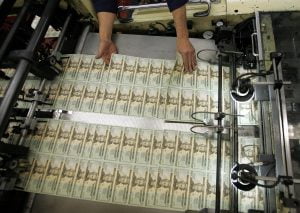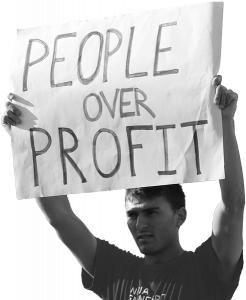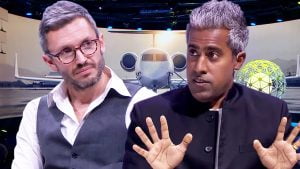It’s time to re-examine endless growth
by Amjad Atallah
A letter from Doha Debates’ managing director Amjad Atallah
It seems it is impossible to go a day without seeing a headline about protests around the world aimed directly or indirectly at the current state of capitalism. In the United States, the country that perhaps best epitomizes consumerist culture and an almost religious adherence to free market economics, Americans are watching a presidential campaign season where the range of discourse veers from those desperately promoting the old order, to frank acknowledgements that capitalism needs to be overhauled, to arguments for “democratic socialism.” Meanwhile in France, the “gilets jaunes,” or yellow vests, continue their weekend protests against the government’s economic policies. In the Arab world, demands for greater democracy have been linked to economic failure from Sudan to Algeria to Tunisia. Everywhere, it seems, the excesses of capitalism have led to clamors for change.
Climate activist Greta Thunberg summed up the zeitgeist of a globally connected young generation in her amazing talk at the United Nations Climate Action Summit last month:
“People are suffering. People are dying. Entire ecosystems are collapsing. We are in the beginning of a mass extinction, and all you can talk about is money and fairy tales of eternal economic growth. How dare you!”
The question of whether eternal economic growth is indeed a fairy tale has been one side of the capitalism coin, while the other has been the obvious and destabilizing income inequality within societies and within the global community. On the other hand, there is much of the world which still expects to achieve the economic status of the “global north” and isn’t ready to step on the brakes just yet.
As we found out in our debate on artificial intelligence in April, technology and automation are very quickly replacing the human work force which supported the old world order. Parallel currencies like bitcoin and local exchange systems that eschew state currencies are already changing the way we live, if not yet our understanding of economics. Is capitalism being made irrelevant by technology more quickly than by politics?
“Everywhere, it seems, the excesses of capitalism have led to clamors for change.”
Amjad Atallah, Managing Director
It would be easy to have had a debate on whether to chuck out capitalism altogether, but at Doha Debates, we have tried to avoid the false binaries of traditional Oxford-style debate models. Jonathan Ellis and Francesca Hovagimian recently published a piece in the New York Times arguing that the goal of traditional school debates “is not to determine the most reasonable or fair-minded approach to an issue, but to defend a given claim at all costs.” And while there is definitely educational value in such a process, when applied to the news cycle and to the most common debate formats on television, the results can be extraordinarily polarizing.
That sums up our thinking at Doha Debates rather nicely. Rather than argue whether capitalism is good or bad, we have brought together three people from the worlds of politics, media and academia with very strong opinions on capitalism, in its various guises, to debate the solutions they believe need to be applied for the betterment of humans and the planet.
Ameenah Gurib-Fakim was the president of Mauritius from 2015 to 2018. Besides being the first woman head of state in that country, Gurib-Fakim is also a biodiversity scientist. As both a scientist and a politician, Gurib-Fakim had a front seat to government efforts to alleviate poverty in her country as well as in other countries of Africa. She makes a strong case that our economies can adapt to a changing world.
Anand Giridharadas, an editor-at-large at Time magazine and author of Winners Take All: The Elite Charade of Changing the World, has become a force in his own right as a leading critic of capitalism’s lack of regulation and oversight. “Plutocrats,” he argues, will act in their self-interest, and even when they advocate for change and participate in philanthropy, they do so in ways designed to ensure that the overall system from which they benefit is perpetuated. He posits that self-regulation needs to be replaced with regulation by representatives of the public.
Jason Hickel, an anthropologist at the London School of Economics (with stints at my alma mater, the University of Virginia), is the author of The Divide: A Brief Guide to Global Inequality and Its Solutions. Originally from Swaziland, now known as Eswatini, Hickel has taken aim directly at the consumerist myth at the center of capitalism: that it is possible to continue to create economic growth through ever-increasing consumerism in a world with finite resources. Rather than infinite growth, could “degrowth” be a way to a sustainable future?
At the heart of the debate will be the question of what “success,” for us as individuals and as societies, looks like. Is acquiring money success, or is it human well-being and happiness? Is an infinitely growing GDP success, or is it a sustainable planet? As I stare at my mobile phone, the latest model, I can’t help but wonder about my own responsibility in this chain.
Of course, our debates and our guests are just the start of the conversation. We want to hear from you and what you think. Tell us your ideas on Instagram, Twitter and Facebook using #DearWorld, and be sure to follow us to get our latest videos. Let me know how we are doing and what you would like to see in future episodes on Twitter @atallahamjad. We are looking forward to seeing you live in our audience at Northwestern University’s campus in Education City in Doha on October 23 and online from around the world.
Watch the debate
Capitalism


